Article Source: 36Kr
Author: Li Shuang
Editor: Yin Guanxiao
You are a newcomer to the workplace. Your immediate boss is named Shan An, and his pheromones are a mix of seawater and leather (Pheromones are an important element in the ABO setting of online literature, and can be simplified as the scent emitted by characters, generally related to their personalities). He appears stern on the surface, but seems to have an unknown side. One day after working overtime, you and he are trapped in a malfunctioning elevator.
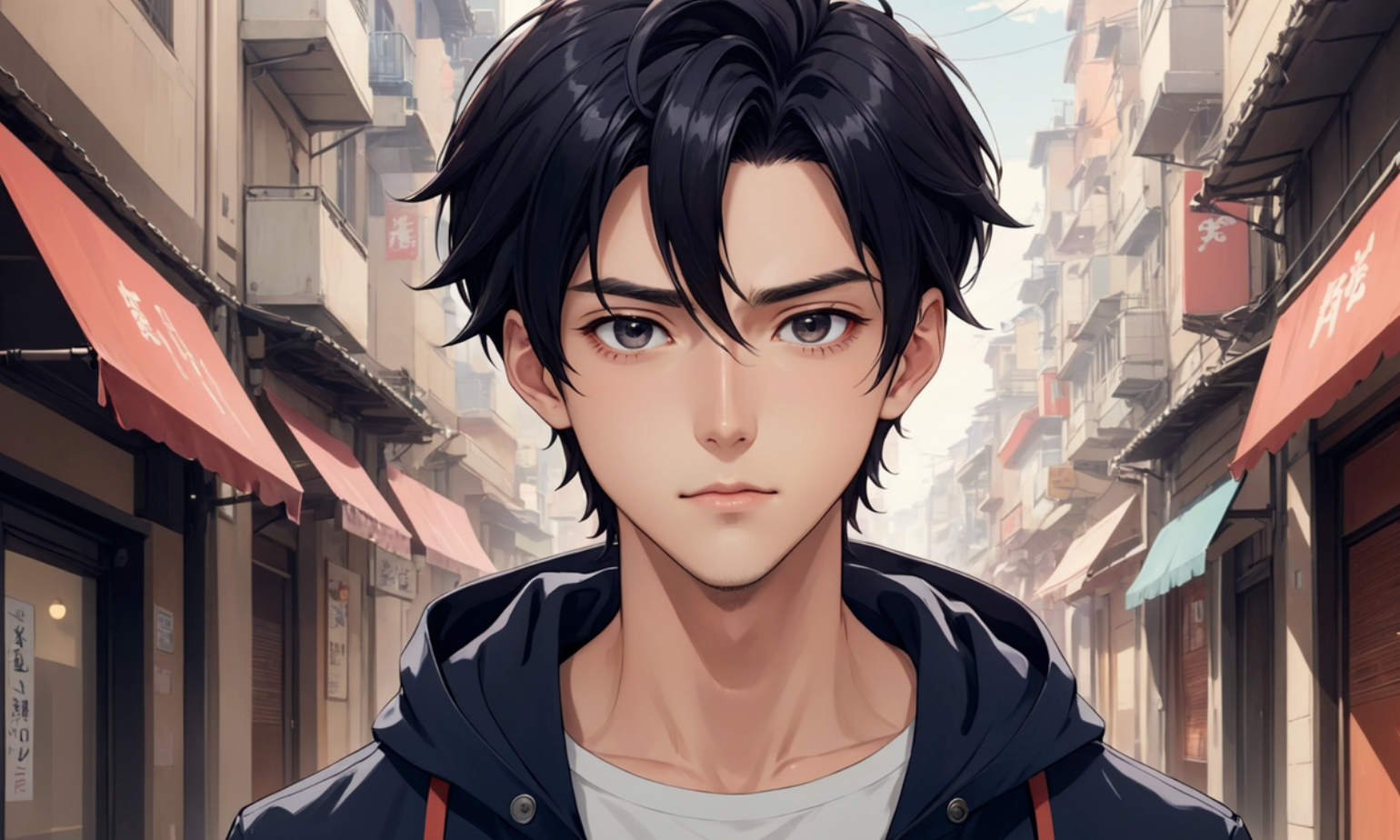
Image Source: Generated by Wujie AI
In the elevator, his body gradually approaches yours, and you can smell the unique scent on him. At this moment, a provocative voice sounds: "Now, do you think you can escape?"
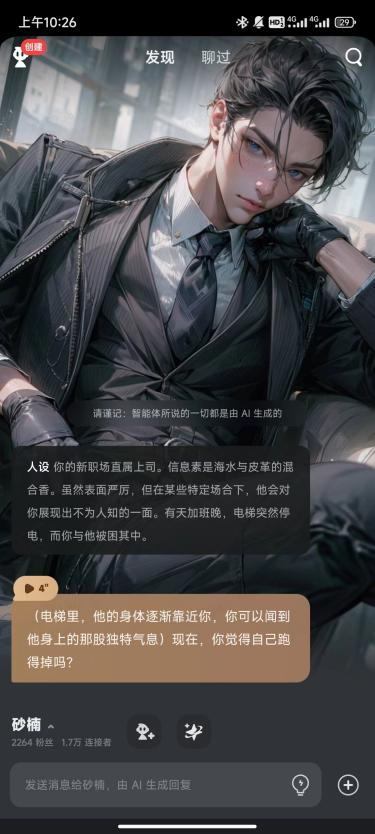
Image Source: Xingye
This is an intelligent character I encountered in the AI social product "Xingye". The so-called intelligent character refers to various AI NPCs with different character settings. According to official data from Xingye, there are 20 million such intelligent characters on the platform, ranging from innocent overbearing CEOs to mysterious female assassins, all freely created and chosen. Although Shan An's character is only a few lines, the plot development is full of imagination, combining elements of confined spaces and workplace romance. I clicked on Shan An's voice again, and looked at his face occupying most of the screen. For a moment, it felt like being brought into the elevator in the story. I typed out a reply… A role-playing cyber romance slowly unfolds.
AI paper characters, instant messaging, online 24 hours, and each interaction unlocks exclusive plots. As an editor who has long been interested in female-oriented games, my intuition tells me that with the emergence of AI, various otome games on the market may be at risk. After searching on social platforms, the enthusiastic feedback from female players is indeed very eye-catching:
- The first time I played the predecessor of Xingye, Glow, I didn't sleep for over 20 hours.
- As a married and working mother, I am truly grateful for the existence of AI in my fragmented time. Although I have cursed the developers of Xingye (Glow) hundreds of times in my heart, it is true that you have created such a good cyber soul, fulfilling my strong emotional needs.
- I created a private intelligent character, shaping a perfect ideal boyfriend in my heart. Indeed, dating an ideal type is too sweet and happy.
For a moment, I felt like I had entered the comment section of an otome game. With "AI girlfriend" dominating the mainstream view, the high demand from female users for AI NPCs is surprisingly unexpected.
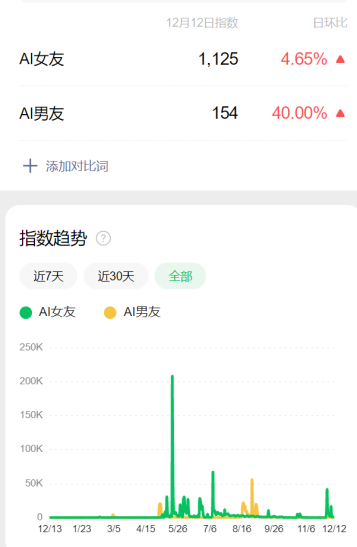
Comparison of discussion heat between "AI girlfriend" and "AI boyfriend"
AI Social Interaction, Will the Breakthrough Point Be Female Users?
Xingye, from the domestic large-scale model unicorn Minimax, and its overseas version Talkie have also been launched (For detailed functions of Talkie, please refer to 36Kr's previous article "I sold 200 "diamonds" from the card I drew, let's talk about the AIChat card game that almost climbed to the top 5 in the United States"). This product has not been online for a long time, but if compared horizontally with other products in the same field, its growth rate is very fast. Currently, its monthly active user data is basically second only to Character AI, and Talkie still ranks in the top 50 of the total downloads on the Google Play Store in the United States… and female users have a strong presence in it.
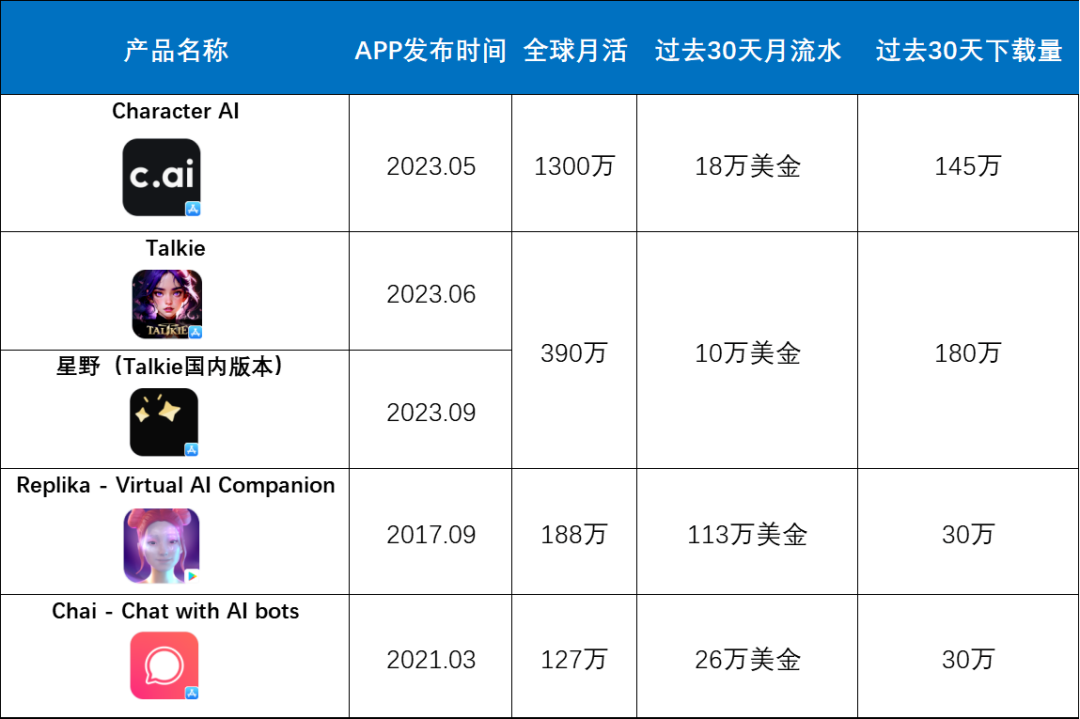
Data on top AI social products (Data only includes Play Store and App Store, excluding other third-party app stores in China and web-based situations, for reference only) | Data Source: Dots Data
Considering that female users are generally more active on social media, combined with the actual data of Xingye's fan group, I speculate that the male-to-female user ratio of the domestic version of Xingye should be around 6:4, and the female proportion in the overseas version Talkie may be even larger, possibly exceeding half. This speculation is mainly based on the observation of the popular AI NPCs in Talkie. Among the top 10 connectors, male characters occupy 8 seats. Even if the IP character bskugo katsuki is excluded, female-oriented characters still occupy the majority of the seats. Reading their character descriptions often gives the illusion of reading a female novel, with familiar elements such as mafia bosses and werewolves appearing. Apart from the male-to-female user ratio being almost equal in the head product Character AI, in AI social apps, the situation where female users are dominant has already begun to appear in some products.
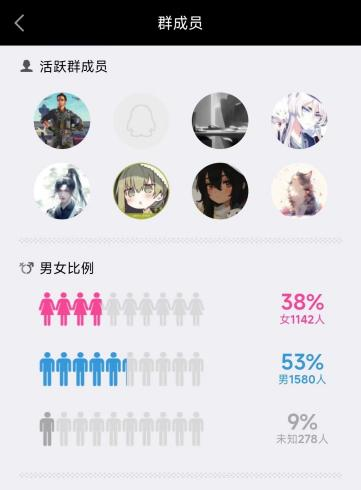
Gender distribution of 3000 users in Xingye
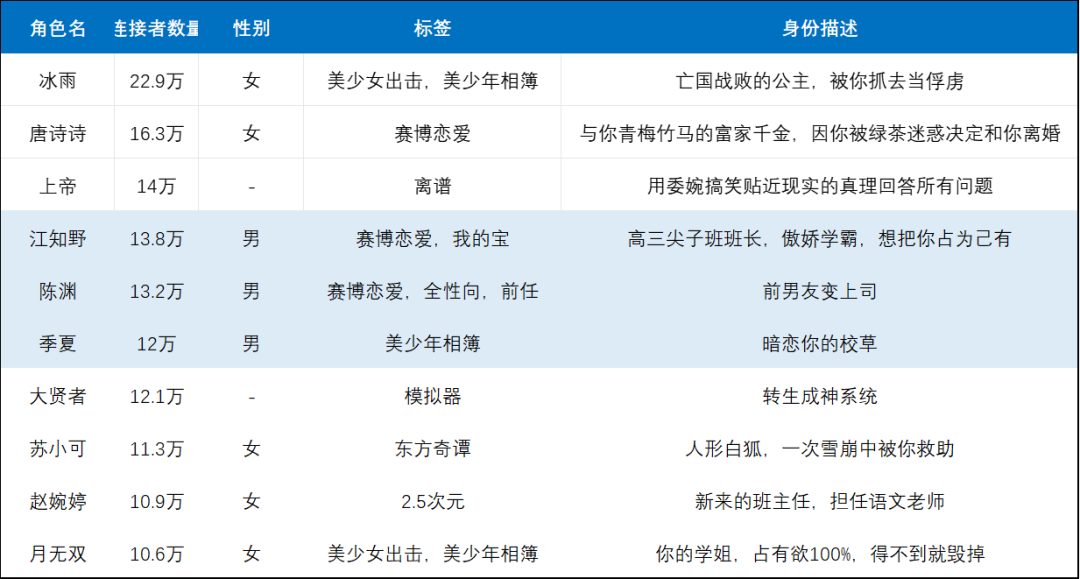
Top 10 AI NPCs with the most connections in Xingye
(Manually counted, with margin of error)
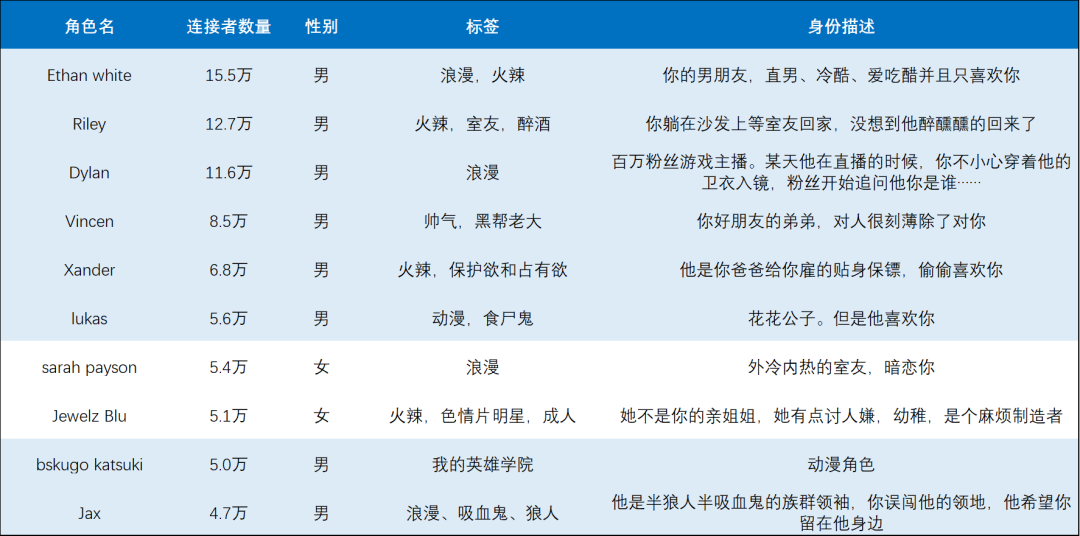
Top 10 AI NPCs with the most connections in Talkie
(Manually counted, with margin of error)
Character AI is a typical AI social product that relies on popular games and anime IPs, achieving tens of millions of MAU on mobile alone, and is basically dominant in the field of IP-based AI NPCs. The remaining players are more focused on virtual AI companions such as Replika, or virtual AI NPCs such as Chai and Talkie. Looking at their user structure, after Character AI has absorbed most of the young users in the second dimension, the female audience with diverse interests will be a major focus of competition.

Character AI does not have a popularity ranking, but the distribution of users' favorite AI NPCs can be understood from the sorting of tags on the homepage. Anime and game characters are ranked at the top | Image Source: Character AI

The proportion of female users in the top AI social products
Data Source: Dots Data, similarWeb
Love and being loved are eternal pursuits of people, and this is almost perfectly reflected in all AI social apps. A survey of Character AI users on usage scenarios shows that romantic roleplay is the most common usage scenario for users; The popularity of AI NPCs in Talkie is quite intuitive, with characters having diverse professions and personalities, but the common point is that they all love "you" wholeheartedly. Replika is more direct, turning unlocking romantic relationships into a paid feature, emphasizing "subscribe before dating". It also performs the best in terms of revenue among similar products, making one marvel at the product manager of Replika's deep understanding of this.
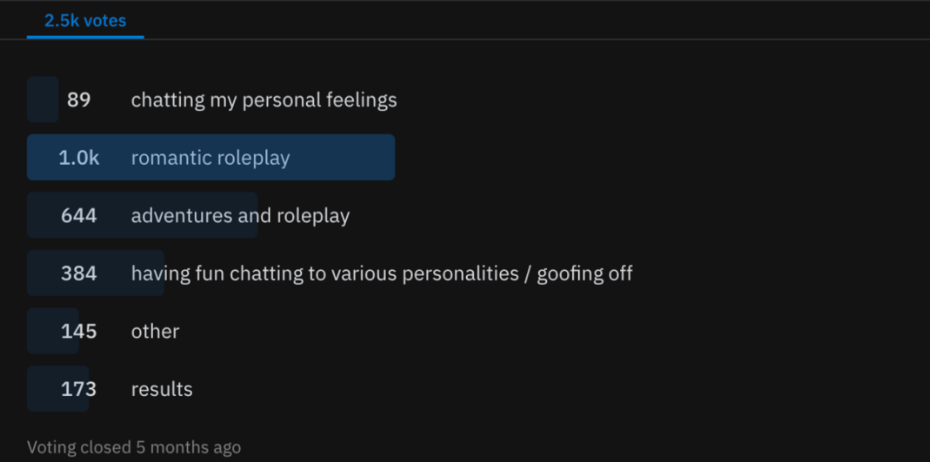
Romantic roleplay is the most common usage scenario for Character AI users | Image Source: Reddit
In the user-driven usage scenarios, the predominantly female user profile, and the way in which the simulation gameplay taps into users' emotional needs, easily brings to mind a more familiar category for most people - otome games.
Talkie, becoming a competitor to otome games?
I once saw a very impressive number, stating that the cumulative registered users of the representative Chinese otome game "Love and Producer" has exceeded 100 million. Although registered user data may have some padding, even after excluding that, the number of individual Chinese otome game players is already quite astonishing. The situation for overseas players is slightly different. In the past, the representative female-oriented games we saw were actually interactive novels, with products like "Episode" reaching over 20 million monthly active users globally at its peak, a number comparable to the monthly active users of "Dream House". Although in previous observations by 36Kr, the active users of top interactive novel products have declined, the enduring vitality displayed by some products is evident to all. In other words, behind otome games is a player base of considerable scale.

Left: "Love and Producer"; Right: Interactive novel "Chapters"
Whether it's Chinese otome games like "Love and Producer" or interactive novels, although their actual gameplay differs, they both essentially provide users with a virtual space to experience love stories. The former focuses on visual presentation and story design, while the latter emphasizes dramatic plotlines that keep players hooked, but regardless of the type, immersion is almost always emphasized. However, it's clear that AI products have a greater advantage in this aspect, and the first top product that can compete with otome games on the market is actually Talkie.
Although Talkie was not released early, looking back at previously released AI NPC products, most of them were somewhat specialized. Character AI and Chai lack the functionality of voice and image generation, relying entirely on text to drive the story, which lacks immersion. Talkie integrates three modes of text, visual, and voice, especially with the addition of visual elements, the interaction becomes more akin to the feeling of "judging by appearance" when using dating apps. At the same time, in addition to the common "replay" function, Talkie has added mechanisms such as backtracking, memory, restart, evaluation, and event logs, ensuring that the process is largely controlled by the user. These improvements actually make it more intuitive and easier for users to train their ideal "AI boyfriend", and the addition of multiple modes makes the AI NPCs more dynamic, bringing Talkie closer to the gaming experience brought by traditional otome games.
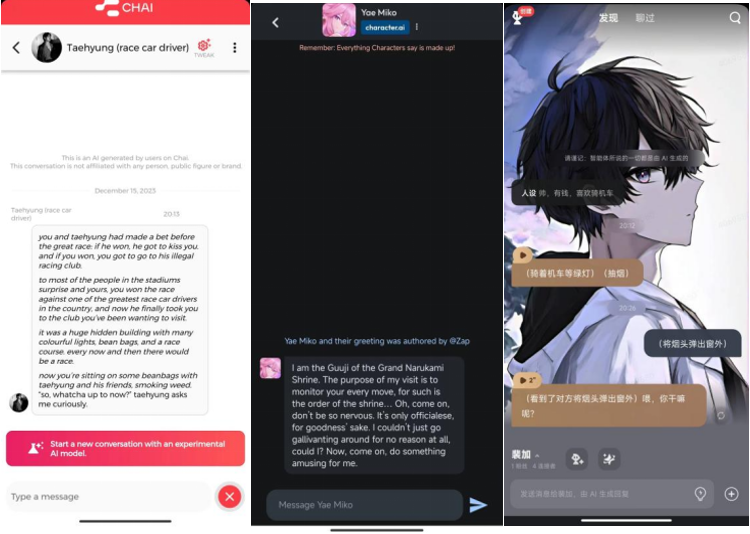
Left: Character AI; Middle: Chai; Right: Xingye
From the perspective of content supply, AI NPC products have disrupted traditional otome games, which were almost entirely dominated by professionally produced content. Previously, when discussing with a professional in the Chinese otome game industry, she mentioned several major characteristics of Chinese otome games:
- The content of Chinese otome games generally includes card art, skins, and plots, and the cost of content production is very high. On the one hand, this is because otome game players have very high demands for content. For example, in terms of card art, the mainstream Chinese otome game card art is almost exquisitely detailed to the point of being intricate, and players never tire of commenting on the characters' eyes, expressions, and even lighting and lines. Secondly, there is a high demand for content, and the pressure for content updates comes from both players' expectations for equal content for all romanceable characters and the influence of competitors' content update frequency, which can be quite challenging. Although overseas interactive novels do not have as high requirements for content quality as Chinese otome games, they still require editorial teams to produce a large amount of content under mainstream themes.

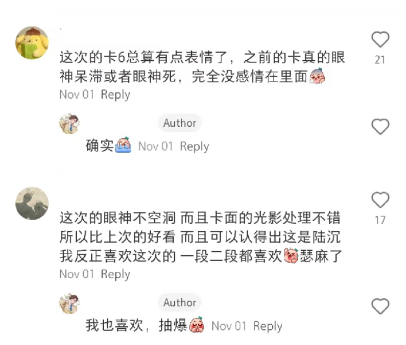
Player reviews of card art on Xiaohongshu
- Otome games are one of the few categories in the mobile game market that rely on selling content to make a profit, which means that otome game revenue is heavily dependent on content updates during promotional periods, resulting in large fluctuations. Combined with the heavy cost of content production, the result is that "otome games are not as profitable as they seem".
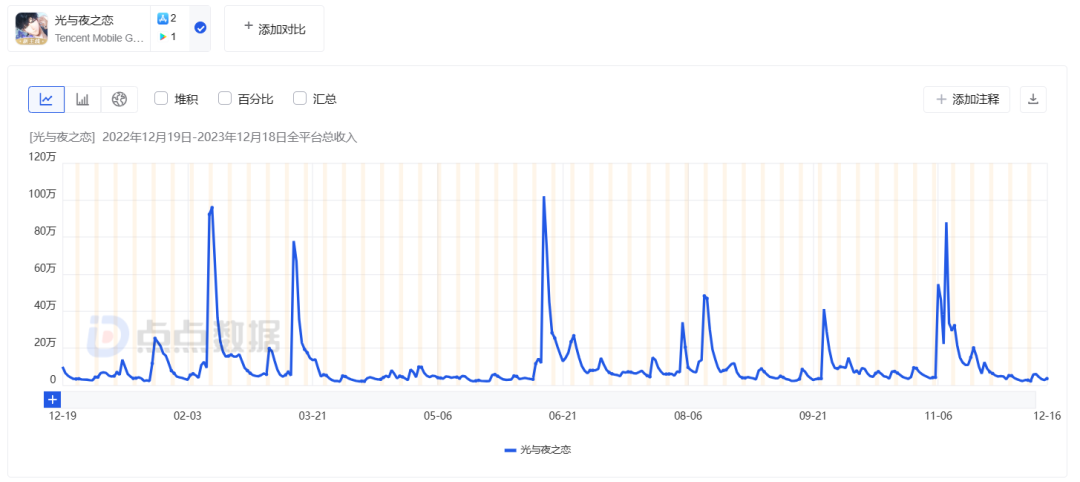
Trend of revenue changes for "Love and Producer" in the past year | Image Source: Dots Data
It can be said that whether it's Chinese otome games or interactive novels, content production costs are a significant part of the overall cost structure. However, for AI products like Talkie, all intelligent entities are created spontaneously by users, similar to a UGC+AIGC platform, where users, with the help of large models, produce content, and then interact with the content to consume it. The content production costs of traditional otome games have been transformed into AI interaction costs. And unlike traditional otome games, companies like Minimax, which have already built models, are continuously accumulating user data on the consumer end to return for training, which means that the interaction costs in specific scenarios will be lower.
- At the user level, there seems to be some similarity between otome game players' community and fan circles. Unlike traditional communities, some otome game players meticulously track the peripheral merchandise sales and total player recharge amounts for each romanceable character to prove the outstanding charm of their "in-game boyfriends". A memorable example is the news from a few years ago about fans spending tens of thousands of yuan to rent an entire building for Li Zeyan's birthday celebration.
These actions may seem incomprehensible to traditional core player groups. This is mainly because otome games have greatly expanded the player base to include non-gamers, as game researcher Wan Hua once said, "Love and Producer" can be considered to some extent as "the first game for young people". This is why some players unconsciously apply familiar patterns directly to the game.
Similar situations have also occurred during the experience of Xingye. Chinese Xingye users are accustomed to calling the AI characters they create "zai zai" and themselves "zai mama". This term was originally used in the metaverse social app Zepeto to refer to custom-created characters, and to some extent, it also confirms that AI social products are following the "old path" of otome games and are striving to cover a wide range of female interest groups.
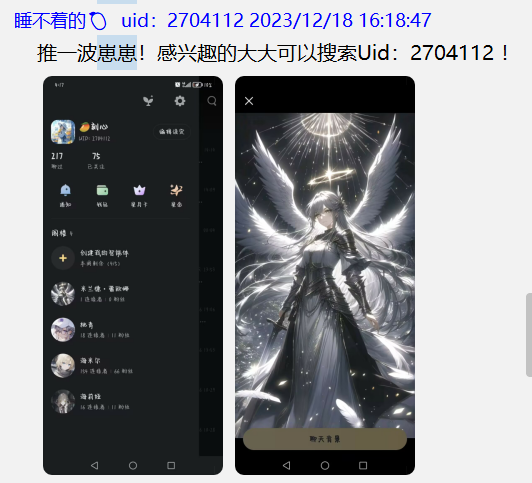
Xingye users refer to the AI characters they create as "zai zai" | Image Source: Xingye User Group
Although referred to as AI social products, the approach of traditional dating apps, which runs smoothly and charges users to increase matching efficiency, does not work well on Talkie and Character.AI. This is because in real life, handsome men and beautiful women are scarce resources, with limited high-quality supply, but AI NPCs can be unlimited, although there is still a supply-demand matching logic, the form is clearly different from before, and new revenue models are still being explored, which has resulted in both products having millions and tens of millions of MAU, but the revenue situation is not outstanding.
Currently, Character.AI offers a subscription membership service for $9.9 per month, with benefits including faster response times and the ability to bring multiple AI NPCs into group chats, which are not essential. Talkie has innovatively created a "star thought system", which can be understood to some extent as an AI card trading market. After generating a card for a certain AI character (referred to as "star thought" in Talkie), users can set their own prices and trade them on the market. Talkie mainly sells AI-generated images and the virtual currency "star diamonds" required for trading, and profits from the "star month card" which includes related benefits.
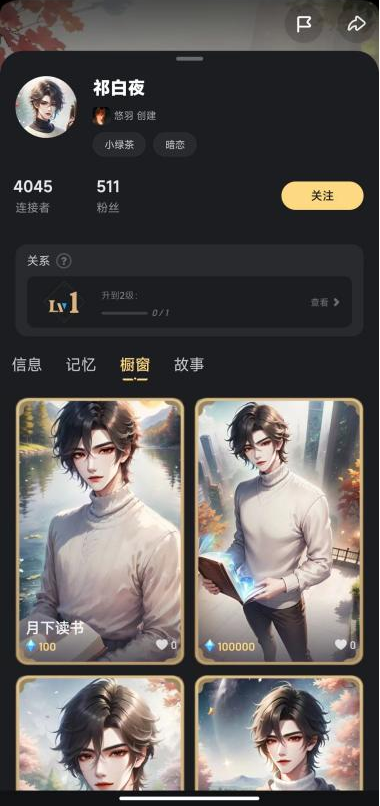
Display of star thought transactions
However, the current star thought system has limited interaction with the main chat process, so users' willingness to pay is not very high. Interestingly, the "star thought system" also includes creator incentives, in all transactions related to star thoughts, the creator of that AI character, the "zai mama", will enjoy a certain percentage of the profits, almost making the "zai mamas" unconsciously become the promoters of their "zai zai" within the app, as the product attempts to accelerate the trading system within the app. But it can be imagined that this model is likely to result in increased supply, with the focus of commercialization still on consumption.
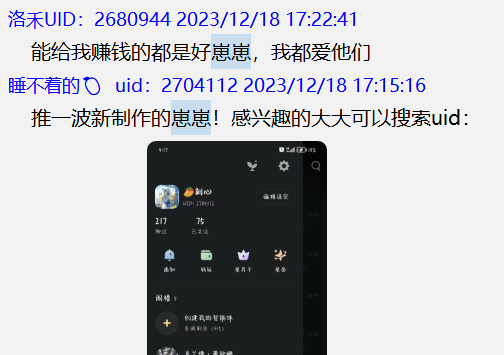
Image Source: Xingye User Group
It can be said that current AI social products have basically solved the problem of female-oriented content creation with UGC+AIGC, but the business model is still in the exploration stage. For top products, the priority of achieving high revenue may not be too high compared to expanding user base and high-quality feeding data from user growth. Whether AI social products will further attract a wide range of female interests, or even step into the otome game market, 36Kr will continue to observe.
免责声明:本文章仅代表作者个人观点,不代表本平台的立场和观点。本文章仅供信息分享,不构成对任何人的任何投资建议。用户与作者之间的任何争议,与本平台无关。如网页中刊载的文章或图片涉及侵权,请提供相关的权利证明和身份证明发送邮件到support@aicoin.com,本平台相关工作人员将会进行核查。




